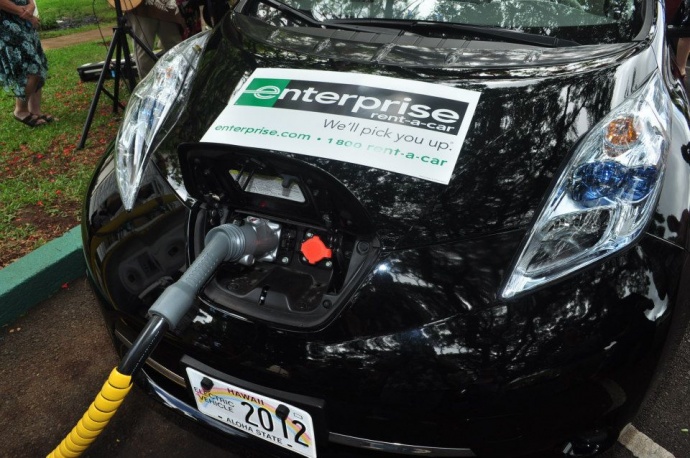Hawaiian Electric Proposes New EV Discount Charging Rates
By Maui Now Staff
The Hawaiian Electric Companies have asked the Hawai‘i Public Utilities Commission to approve discount electric vehicle charging rates in a new time-of-use program.
The new rates aim to promote plug-in electric vehicle use by offering simpler terms and sign-up procedures compared to the existing EV discount charging program. It also is intended to encourage more use of excess electricity generated by rooftop solar systems during the middle of the day.
HECO is asking the PUC to approve this proposal by the end of September, when the present pilot ends. However, HECO said that customers already enrolled in the present EV pilot program have the option to continue at their existing rates when the current pilot expires at the end of September, 2015.
“EV numbers continue to increase and automakers are bringing more advanced plug-in electric
vehicles to market,” said Jim Alberts, Hawaiian Electric senior vice president for customer service. “And with over 70,000 customers statewide who have or will soon have rooftop solar, we see increasing amounts of excess solar electricity available at mid-day.”
“The proposed new rates will help make greater use of that solar electricity and accelerate EV
adoption in Hawai‘i,” Alberts said.
In addition to upgraded discount charging rates, HECO is installing up to 25 DC fast chargers across O‘ahu, Maui County and Hawai‘i Island to alleviate EV drivers’ “range anxiety.” HECO is also working with stakeholders on other endeavors as new ideas and
technologies enter the market.
The proposed rates will have only two time-of-use schedules over 24 hours instead of three.
Charging an EV at home using electricity from the grid will be most expensive during peak
electricity demand, from 3 p.m. to 9 p.m. All other hours will be at the lower off-peak
rate.
EV owners may still choose to add a separate meter just for EV charging or keep a single
meter for all household and charging use.
Signing up for EV rates will also be simpler. Customers need only certify ownership of a plug-in
electric vehicle. As with the discount charging pilot in place for the last five years, customers on
Hawai‘i Island, Maui, Moloka‘i, Lāna‘i and O‘ahu would be eligible to participate, after the PUC’s
approval of the program.
For commercial customers, the proposed new EV rates will waive “demand charges” during off-peak
periods and eliminate demand charge minimums, making it less expensive for commercial customers who wish to provide charging for EV fleets or their customers with EVs.
HECO suggests the new program should continue through June 30, 2020, when all EV rates would be re-considered for the future.
The new rate is designed to provide more off-peak hours for home EV charging with a 6.1¢ per
kWh savings for a typical residential customer on O‘ahu. By charging off-peak, that driver is
estimated to save half the cost to “fuel” an electric vehicle (compared to a mid-sized gasoline-fueled
sedan) by buying no gasoline, but paying a slightly higher monthly electric bill.
The proposed per kWh savings for off-peak EV charging for a typical residential customer on Hawai‘i
Island is 9.2¢; on Maui, 7.3¢; on Lāna‘i, 7.1¢; and on Molokai, 9.4¢.
The following are comparative sample driving costs under the proposed rates based on O‘ahu electricity and gasoline costs:
An EV Sedan on proposed TOU rate will cost 6¢ per mile. The current rate for an internal combustion engine powered compact is 10¢ per mile; hybrid sedan, 7¢; internal combustion mid-size sedan, 12¢.











